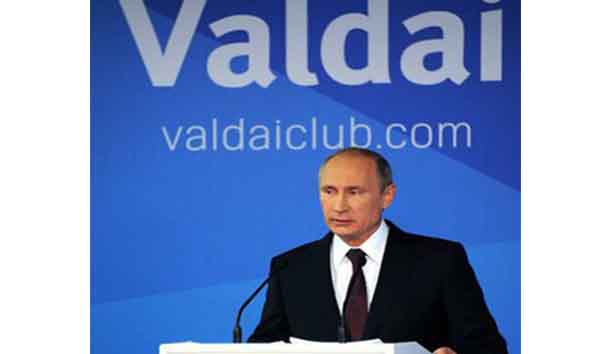In the lands of “Real Socialism,” four or five decades ago, it was a standard practice to denounce the “enemies of the people” without actually quoting their incriminating statements. I remember the final major press campaign against Milovan Djilas, when I was a preteen in Tito’s Yugoslavia. It consisted of ritualistic slanders that asserted his sins, but no actual words from the man himself that prompted such a verdict. Solzhenitsyn and Sakharov were subjected to similar treatment, some years later, in Brezhnev’s Soviet Union.
The American mainstream media are faithfully copying this practice today. When Russian President Vladimir Putin gave a major foreign-policy address at a meeting of the Valdai Club in Sochi on October 24, the New York Times set the tone of the commentariat with its assessment that he “unleashed perhaps his strongest diatribe against the United States yet.” Putin’s objective was “to sell Moscow’s view that American meddling has sparked most of the world’s recent crises,” including the claim that “the United States supports ‘dubious’ groups ranging from ‘open neo-fascists to Islamic radicals.’” (Shake your head in disbelief, Times reader, and roll your eyes.) The Washington Post called the speech “a long anti-Western diatribe” and “a bitter distillation of Putin’s anti-American rhetoric,” which “blasted the United States as taking advantage of its powerful post-Cold War position.” “Putin Unleashes Fury at U.S. ‘follies,’” the Financial Times asserted. Und so weiter.
The word diatribe, parroted by dozens of other media outlets, is defined by Merriam-Webster as “a bitter and abusive speech.” Its synonyms are “harangue, tirade, vituperation.” Far from being an irrational rant, however, Putin’s address—somber in tone and significant in policy implications—provided a summary of the state of the world that would be deemed conventional by Chronicles readers and contributors. He opened by saying that “it is impossible to move forward without spiritual, cultural and national self-determination”: “We can see how many of the Euro-Atlantic countries are actually rejecting their roots, including the Christian values that constitute the basis of Western civilization. They are denying moral principles and all traditional identities: national, cultural, religious and even sexual. They are implementing policies that equate large families with same-sex partnerships, belief in God with the belief in Satan. The excesses of political correctness have reached the point where people are seriously talking about registering political parties whose aim is to promote paedophilia.”
People in many European countries are embarrassed or afraid to talk about their religious affiliations, Putin noted. Holidays are abolished or even called something different; their essence is hidden away, as is their moral foundation, yet Western leaders are aggressively trying to export this model all over the world: “I am convinced that this opens a direct path to degradation and primitivism, resulting in a profound demographic and moral crisis. What else but the loss of the ability to self-reproduce could act as the greatest testimony of the moral crisis facing a human society? Today almost all developed nations are no longer able to reproduce themselves, even with the help of migration. Without the values embedded in Christianity and other world religions, without the standards of morality that have taken shape over millennia, people will inevitably lose their human dignity. We consider it natural and right to defend these values. One must respect every minority’s right to be different, but the rights of the majority must not be put into question. At the same time we see attempts to somehow [sic] revive a standardized model of a unipolar world and to blur the institutions of international law and national sovereignty. Such a unipolar, standardised world does not require sovereign states; it requires vassals. In a historical sense this amounts to a rejection of one’s own identity, of the God-given diversity of the world.”
As we now know, these views are unfit to print in the New York Times or any other mainstream organ.
On world affairs, Putin accused the United States of precipitating the collapse of the international security system and of abusing her role as global hegemon. He said that the unipolar world order has proved unsustainable for a hegemonic world power and that this “unstable structure” is unable to counter threats such as regional conflicts and terrorism. Putin insisted that the Western powers, not Russia, instigated the crisis in Ukraine by telling Moscow “‘It’s none of your business.’ And instead of a complex—but, I stress, civilized—dialogue, they brought the matter to a coup d’état. They plunged the country into chaos, into the collapse of the economy and society, into a civil war with enormous casualties.”
“Apparently, they endlessly want newer and newer color revolutions,” Putin said of the regime-change mania, “they consider themselves to be genius artists, they can’t stop, and they don’t think at all about the consequences.”
The significance of Putin’s address is in his evolving view of the West in general, and the United States in particular, as fundamentally inimical to Russia—not only in geopolitical but in cultural and moral terms. This is a major shift from the warnings aired in his famous 2007 Munich speech, when he was also critical of Western policies but proceeded from the implied position that Russia and the West shared the same civilizational assumptions and global-historical interests.
The positions articulated in Putin’s Valdai speech are likely to be translated into long-term policies of sustained resistance to U.S. unilateralism everywhere. The detrimental consequences to the American interest will likely exceed any supposed gains from enhanced U.S. influence in Ukraine.
[Kremlin.ru [CC-BY-3.0 (http://creativecommons.org/licenses/by/3.0) or CC-BY-SA-3.0 (http://creativecommons.org/licenses/by-sa/3.0)], via Wikimedia Commons]

Leave a Reply